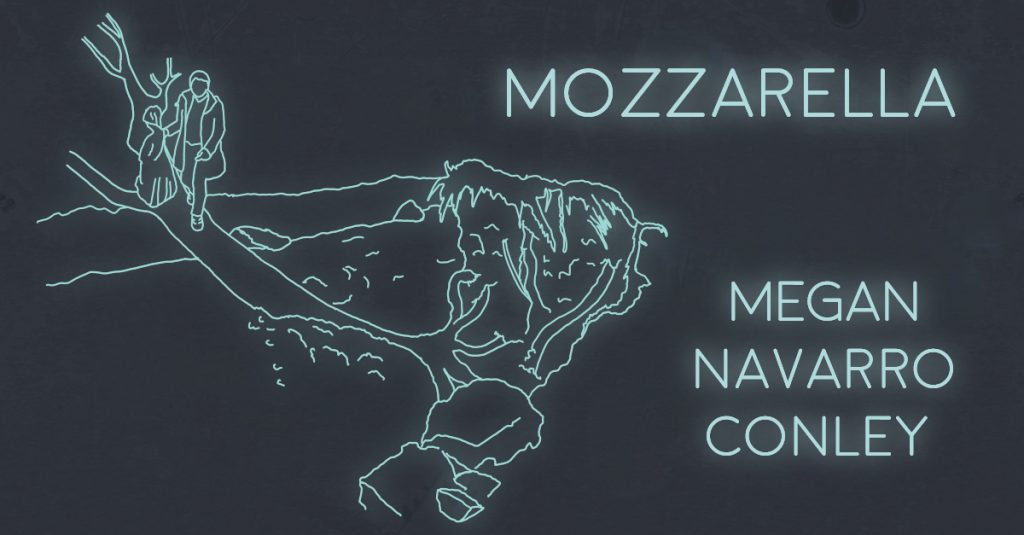After they drown and bloat with water, white people look like mozzarella cheese. Not the shredded kind in resealable bags, but the smooth spherical cheese in the little wet bags near the deli counter. Sometimes I buy this cheese from Trader Joe’s because plucking it off the refrigerated shelf makes me feel fancy. I like to turn it over in my hands, cup it in my palm while waiting in line.
I learn this fact about white people and cheese while standing in a river. I am nineteen, and I still think I’m going to be a doctor. The director of my honors program tells us that we need leadership positions if we want to apply to med school, so I am standing in this river wearing a neon green hat that shouts Volunteer Team Leader. Behind me, on the shore, are ten other college kids looking to fill lines on their resumes. It’s 9am, and we are all cold and tired and hungover, but because I am the team leader, the park ranger hands me rubber pants and boots to wade into the water.
It rained the night before, but the tree lying halfway across the river clearly fell a long time ago. It’s caught litter in its branches, a matted solid clump of chip bags, soda cans, plastic bags, anything unnaturally dyed and saturated that immediately draws the eye. My friend stands on top of the tree, dry and holding open a garbage bag.
I’ve picked up most of it. At the top of the ravine, I can feel the park ranger staring at me while the other students pick around the shore, poking into bushes, around tree roots. I am wondering if his job is always this cushy, when my friend pinches her nose.
“It smells like shit.”
“Really? I have a bad sense of smell.”
“It smells like something’s died.”
I try sweeping the leaves downriver, fishing through the grey-brown muck. I think I’m almost done with this area, ready to wade out of the water and step out of these rubber boots which will stand up even when I’m not in them.
“There’s this big thing against the tree,” I say, and my friend crouches down above me to get a better look.
Not that we can see anything in particular, but I can feel the weight of it, pressing both my hands against its squishy mass, it’s at least half the length of the tree trunk. I start thinking out loud about what it could be: “I think it’s a waterlogged pillow. It’s so squishy and heavy because it’s all weighed down, but this is definitely cloth.” My fingers search for the edges of it, manage to grip parts of the fabric, and this is when I begin to pull.
My friend slaps her hand over her mouth, and I hear someone else scramble up the ravine, shouting to the park ranger.
“It’s just a mannequin,” I tell my friend, but she begins laughing and shaking her head, on hands and knees as she crawls along the tree trunk.
I am still pulling on it, using all my weight to try to dislodge it from the tree, but it only rocks back and forth in the water, cresting small waves against my waist. I can hear the park ranger speaking into static, the other volunteers buzzing with excitement, but I keep standing in the river, and I keep pulling, and even now, I don’t know why I did this. Maybe because I am nineteen, and I want to be a leader, and I want to be a lot of things that, deep down, I know I am not. Maybe I keep pulling because I don’t want to accept what it is, because if I have to accept what it is, then I have to accept what I am, and I have to accept that I am holding someone, I am holding an unfortunate someone the same way I refuse to be held. If I have to accept what is in front of me, I have to accept all the rest too, and I can’t do that because I am weak, so I keep pulling. If I keep pulling, this will be something else, this will be happening to somebody else, and I need that to be true, even if it’s wrong, even if it’s disgusting and horrible to think this way. If I can make myself into what I am not, then this isn’t allowed to be someone’s body, and I will keep pulling until it isn’t.
Years later, I’m going to learn what the word dissociating means. I will think that the word is too soft to mean what it does, this violent expulsion from the body to protect the mind from further harm.
It turns over in the water, suddenly, revealing a smooth, creamy surface. I press a fingertip into it, the way you press a sunburn to see the lightbulb left behind, but all I leave behind is an indent, deep enough to fill with water. I pull again, and then his arm pops free—a doughy wrist, a ballooned hand. Looking back on it now, I should’ve held it right there in the water, until the police arrived.

